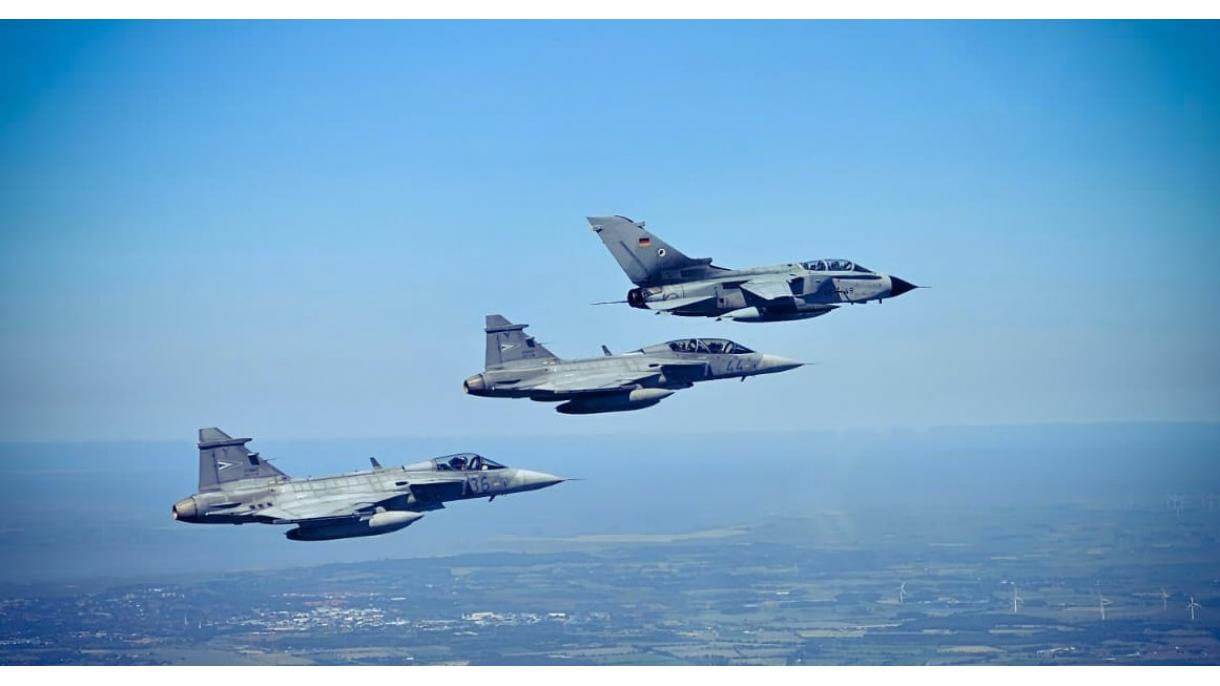Amir Hossein Askari, in an interview with the website of the Strategic Council on Foreign Relations, stated that the largest NATO air exercise, known as “Air Defense 23” after four years of preparation, will be held over Germany, while 25 countries, including Finland, Sweden, and Japan are also present in it, and noted: This is the largest air exercise of its kind since the foundation of the NATO military alliance. Some 250 planes were deployed in six German military airfields, and the US alone had sent 100 planes to the exercise.
He added: The skies of northern Germany and the North Sea, in the east and a smaller strip in the south of Germany, were assumed to be a critical area, and efforts were made to show that in that congested sky, even NATO can, to a large extent, enter the airspace without disturbance and defend its airspace.
The Director of the Research-News Center of European Studies stated that although that exercise carried a deterrent message, it was said that it was planned after the chaotic departure of the United States from Kabul Airport in 2021, adding: In that exercise, in addition to testing how the aircraft of NATO member countries communicate with each other and the coordination of the flight crews of cargo and fuel planes, both of which are widely used in the war in Ukraine, evacuation from an airfield was also practiced. This measure was a direct response to the chaotic evacuation of the United States from Kabul’s Hamid Karzai International Airport in August 2021.
Saying that showing NATO’s unity in the face of aggression and strengthening deterrence was one of the most important targets of that exercise, Askari continued: Even a German military official said that the purpose of proposing that exercise in 2018 was to end the annexation of Crimea. Therefore, while showing the capabilities and solidarity of the alliance, NATO emphasizes that if Moscow tries to attack the members of the alliance, it will defend them.
He added: In that exercise, Germany has simulated the attack from the east, which attempts to advance towards the Baltic Sea where NATO has activated its Article 5 and come to the defense of the attacked country. Although Russia’s war against Ukraine has strengthened NATO, especially its eastern wing, the need for that military alliance to strengthen its military power is clear to its members, as Germany has recently committed to making a significant change in defense policy and increasing its budget.
The international affairs analyst reminded: Although it was said that the exercise’s purpose was not Russia, military officials repeatedly spoke of a decisive response to Russia and Putin himself during that exercise. However, the exercise did not involve any flights near Russia’s borders or over lines such as Kaliningrad, which borders NATO member states Poland and Lithuania.
Regarding the completion of the permanent US presence in Europe in the current situation and the strengthening of NATO’s presence in Europe and its consequences, Askari said: The exercise is being held. At the same time, NATO claims an increase in the presence of Russian aircraft on its borders and claims that in recent days, NATO fighter jets have carried out several missions to check the unidentified Russian military planes over the Baltic Sea.
At the same time, he stated that NATO and the West were pursuing two strategies against the East and pointed to the Russian military threat and China’s geopolitical blockade, especially in the routes desired by China in the Belt and Road Initiative. He added: In this regard, the West is trying to show that it is still the dominant power and believes in coercive power, and if necessary, it will put the North Atlantic Treaty against Russia, China, and their allies. The military dimension is complementary and in line with the efforts to block the political geography applied against China.
The expert on international affairs, emphasizing that the joint exercise can send the message of NATO alliance to its opponents, at the same time stated: that Europe may be able to stand against Russia in the short term, but in the end, the territorial connection between Europe and Russia and mutual needs, in the long run, make European countries unable to form a united front against Russia. There are critical positions against the current situation in Hungary and even in France. This alliance is fragile because the energy crisis could repeat in Europe this winter.
Askari added: The message that NATO and especially the US are trying to convey to Putin and Xi Jinping with this exercise is not very coherent; because during the same days of the exercise, different voices are heard in France, Hungary, and Poland. Such faults are active in the West, and Europe may appear united in appearance, but in practice, this maximum coherence will be broken down.
Referring to the warnings about the possibility of the spread of war in Ukraine in the event of strengthening of militarism in Europe or sending the troops of NATO member states to Ukraine to confront Russia, he said: Although Poland is an anti-Russia country and full-fledged anti-Putin, when the issue the Ukraine war was raised, Polish farmers had strong objections to the importation of Ukrainian wheat and even giving them jobs. Such faults exist even in conservative societies like Poland. This situation exists in other European countries as well.
Askari said the deployment of Russian nuclear weapons to Minsk caused an increase in the level of expenses of the West and added that: Militarization of Europe is intensifying while the US, due to Russophobia in Europe, easily imposed the level of NATO’s military expenses on European countries, and this is an issue that is evaluated only in line with the interests of the US. However, serious factors in Europe continue to strengthen the divergence faults in an anti-Russian alliance.










0 Comments